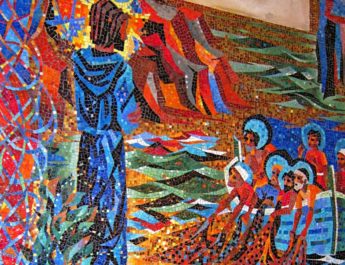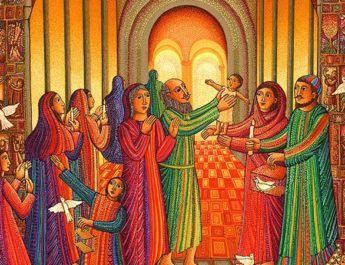Hebrews 5:1-10
Ordinary B47
1 Every high priestA chosenB from among mortalsC is put in charge ofD things pertaining to GodE on their behalf,
A “high priest” = archiereus. From archo (to rule, begin, have first rank or have political power) + hiereus (a priest literal or figurative – of any faith); {from hieros (sacred, something sacred, temple, holy, set apart; something consecrated to God or a god)} This is a high or chief priest.
B “chosen” = lambano. It does not refer to passive receiving of something, but active acceptance or taking of something whether it is offered or simply nearby. It focuses on individual decision and action.
C “mortals” = anthropos. Probably from aner (man, male, husband) + ops (eye, face); {from optanomai (to appear, be seen); perhaps from horao (become, seem, appear)}. This is human, humankind. Used for all genders.
D “put in charge of” = kathistemi. From kata (down, against, throughout, among) + histemi (to make to stand, place, set up, establish, appoint, stand by, stand still, stand ready, stand firm, be steadfast). This is to appoint, set in order or set in place, constitute, give standing or authority, put in charge, designate.
E “God” = Theos. From Proto-Indo-European origins, meaning do, put, place. This is God or a god in general.
to offerF giftsG and sacrificesH for sins.I
F “offer” = prosphero. From pros (at, to, with, towards, advantageous for) + phero (to bear, bring, lead, make known publicly; to carry in a literal or figurative sense). This is to offer gifts or sacrifices, to bring up.
G “gifts” = doron. 19x in NT. From didomi (to give in a literal or figurative sense). This is gift, offering, sacrifice; emphasizes that the gift is given freely, voluntarily
H “sacrifices” = thusia. From thuo (to breathe violently, seethe, rage; properly, to rush as breathing heavy; so smoke as in offering an animal sacrifice by fire; by extension, killing or slaying in general). This is a sacrifice or offering. It can refer to the act of sacrifice or the thig being sacrificed. Also, this is sacrifice in a literal or figurative sense.
I “sins” = hamartia. From hamartano (to miss the mark, do wrong, make a mistake, sin); {from a (not) + meros (a part or share)}. Literally, this means not having one’s share or portion – like not receiving inheritance or what was allotted to you. This word means missing the mark so it is used for guilt, fault, and acts of sin.
2 He is ableJ to deal gentlyK with the ignorantL and wayward,M since he himself is subject toN weakness;O
J “is able” = dunamai. This is to be able, or something that is possible. It can also be empowered or being powerful. The Greek word for “miracle” (dunamis) comes from this root.
K “deal gently” = metriopatheo. 1x in NT. From the same as metrios (moderately, slightly, greatly); {from metrios (moderate) or from metron (is a measure, whether of distance or volume; a tool for measuring or the measure itself; figuratively, that which determines what is sufficient)} + pathos (passion, lust, suffering, something that happens to you, strong feelings); {from pascho (to be acted on for good or ill; often used for negative treatment; properly, feeling strong emotions – especially suffering; can also be the ability to feel suffering)}. This is to deal with while moderating one’s emotions. So, it is treating with compassion or gently.
L “ignorant” = agnoeo. From a (not) + noieo (to perceive, think, understand); {from nous (mind, understanding, reasoning faculty, intellect, capacity to reflect); from noos (mind); probably from the base as ginosko (to know, recognize, realize, perceive, learn; gaining knowledge through personal experience)}. This is unaware not to know. Sometimes it is willful ignorance, but other times it is simple not knowing.
M “wayward” = planao. From plane (wandering – used figuratively for deceit, error, sin, fraudulence, or wandering from orthodoxy); from planos (wandering, misleading, a deceiver or imposter). This is to wander, lead astray, mislead, mistake, seduce, or deceive. Generally used to refer to sin – going off the right path or roaming from truth/virtue. This word shares a root with “planet” (as a heavenly body that wanders).
N “is subject to” = perikeimai. 5x in NT. From peri (about, concerning, all around, encompassing) + keimai (to lie, recline, be placed, lie outstretched, be appointed). This is to lie around, surround, be clothed in, be bound, hang, be subject to.
O “weakness” = astheneia. From asthenes (without strength, sick, deprivation; weak in a moral or physical sense); {from a (not) + sthenes (strong, vigor); {from the base of sthenoo (to strengthen so that one can be mobile); from sthenos (strength)}}. This is weakness, frailty, illness, suffering, or calamity. It is any kind of sickness or injury that includes weakness or diminishes your ability to enjoy or accomplish what you would choose.
3 and because of this he mustP offer sacrifice for his own sins as well as for those of the people.Q 4 And one does not presume to takeR this honor,S but takes it only when calledT by God, just as AaronU was.
P “must” = opheilo. Perhaps from the base of ophelos (advantage, gain, profit); from ophello (heaped together, accumulate, increase). This is to be indebted morally or legally – having an obligation one must meet. This term came from the legal world, but was then adopted in reference to morality. In the New Testament it is used for humanity’s ethical responsibility.
Q “people” = laos. This is the people or crowd – often used for the chosen people. This is where the word “laity” comes from.
R “take” = lambano. Same as “chosen” in v1. See note B above.
S “honor” = time. From tino (to pay, be punished, pay a penalty or fine because of a crime); from tio (to pay respect, value). This has to do with worth or something’s perceived value. Literally, it means price, but figuratively, it means the honor or value one sees in someone or something else. It can be esteem or dignity. It can also mean precious or valuables.
T “called” = kaleo. Related to keleuo (to command, order, direct); from kelomai (to urge on). This is to call by name, invite, to name, bid, summon, call aloud.
U “Aaron” = Aaron. 5x in NT – 3x in Hebrews. From Hebrew Aharon (Aaron); {derivation uncertain. May mean “bearer of martyrs” OR be related to Ancient Egyptian ꜥḥꜣ rw (warrior lion) OR elevated, exalted, high mountain}. This is Aaron. See https://en.wiktionary.org/wiki/Aaron
5 So also ChristV did not glorifyW himself in becomingX a high priest, but was appointed by the one who said to him,
“You are my Son,Y
today I have begottenZ you”;
V “Christ” = Christos. From chrio (consecrate by anointing with oil; often done for prophets, priests, or kings). Literally, the anointed one, Christ. The Greek word for Messiah.
W “glorify” = doxazo. From doxa (glory, opinion, praise, honor, renown; particularly used as a quality of God or manifestation of God – splendor); from dokeo (to have an opinion, seem, appear, suppose; a personal judgment; to think); from dokos (opinion). This is to render or hold something as glorious, to glorify, honor, magnify, or celebrate. This is ascribing weight to something by recognizing its true value or essence.
X “becoming” = ginomai. This is to come into being, to happen, become, be born. It can be to emerge from one state or condition to another or is coming into being with the sense of movement or growth.
Y “Son” = huios. This is son, descendant – a son whether natural born or adopted. It can be used figuratively for other forms of kinship.
Z “begotten” = gennao. Related to “becoming” in v5. From genna (descent, birth); from genos (family, offspring, kin – in a literal or figurative sense); from ginomai (see note X above). This is to beget, give birth to, or bring forth. Properly, it refers to procreation by the father, but was used of the mother by extension. Figuratively, this can mean to regenerate.
6 as he says also in anotherAA place,
“You are a priestBB forever,CC
according to the orderDD of Melchizedek.”EE
AA “another” = heteros. This is other, another, different, strange. It is another of a different kind in contrast to the Greek word allos, which is another of the same kind. This could be a different quality, type, or group.
BB “priest” = hiereus. Related to “high priest” in v1. See note A above.
CC “forever” = eis + ho + aion. Literally, “to the age.” Aion is from the same as aei (ever, always, unceasingly, perpetually; on every occasion). This is an age, cycle of time, course, continued duration. It is also used to describe the eternal or forever. This is the word used to discuss the present age or the messianic age.
DD “order” = taxis. 9x in NT. From tasso (to arrange, appoint, determine). This is order, arrangement, position, discipline, being orderly, approval, morale. It is used in military settings to describe rank. Later included indication of dignity or character. It is part of the root of the word “taxonomy.”
EE “Melchizedek” = Melchisedek. 8x in NT– all in Hebrews. From Hebrew Malki-tsedeq (Melchizedek, meaning “my king is right”); {from melek (king, royal) + tsedeq (rightness, righteousness, just cause, vindication; that which is right in a natural, moral, or legal sense; abstractly equity; figuratively prosperity)} This is Melchizedek, “my king is righteous.”
7 In the days of his flesh,FF Jesus offered up prayersGG and supplications,HH with loudII criesJJ and tears,
FF “flesh” = sarx. May be from saroo (to sweep, cleanse by sweeping); from sairo (to brush off). This is flesh, the body, human nature, materiality, kindred. Flesh is not always evil in scripture (as when it refers to Jesus taking on a human body). However, it is generally used in a negative way for actions made selfishly and not through faith. This can mean animal flesh, i.e. meat, or refer to body in contrast to soul/spirit. Flesh can be a way of talking about how things or people are related or talking about human frailty (physical or moral).
GG “prayers” = deesis. 18x in NT. From deomai (having an urgent need because one is missing or needing something so it is an earnest appeal or pressing request); from deo (to tie, bind, fasten, impel, compel; to declare something against the law or prohibited). This is a request coming from a deep personal need or want. So, it is supplication or prayer.
HH “supplications” = hiketeria. 1x in NT. From the base of hikanos (sufficient, suitable, adequate, competent, ample); from hiko or hikneomai (to reach, come to, attain) OR from hiketes (a suppliant). This refer to an olive branch that one would hold when making a humble request. It signifies an earnest request for peace, help, or reconciliation. This word is supplication or entreaty.
II “loud” = ischuros. From ischuo (to be strong, healthy and vigorous, able, have power, prevail; strength that engages a resisting force); from ischus (strength, might, power, force, ability; power that engages immediate resistance). This is strong – first of physical strength. Later, also used figuratively for forcible, powerful, mighty, vehement, or sure.
JJ “cries” = krauge. 6x in NT. From krazo (to cry out, scream, shriek; onomatopoeia for the sound of a raven’s call; figuratively, this is means crying out urgently without intelligible words to express something that is deeply felt). This is a very emotional shout or cry generally or clamor against someone else. It can express alarm, trouble, or grief.
to the one who was able to saveKK him from death,LL and he was heardMM because of his reverent submission.NN
KK “save” = sozo. From sos (safe, rescued, well). This is to save, heal, preserve, or rescue. Properly, this is taking someone from danger to safety. It can be delivering or protecting literally or figuratively. This is the root that “savior” and “salvation” come from in Greek.
LL “death” = thanatos. This is death, whether literal or spiritual. It can also refer to something that is fatal.
MM “heard” = eisakouo. 5x in NT. From eis (to, into, for, among) + akouo (listen, hear, understand through hearing). This is hearing deeply and intentionally. It can also mean to obey, heed, or comply – understanding prompting action.
NN “reverent submission” = eulabeia. Related to “chosen” in v1. 2x in NT. From eulabes (literally handling well or grasping what is good; cautious or circumspect; by extension, devout, pious, or God fearing); {from eu (good, well, well done, rightly) + lambano (see note B above)}. This is reverence, pious caution, being dedicated to following God’s call to goodness.
8 Although he was a Son, he learnedOO obediencePP through what he suffered;QQ
OO “learned” = manthano. This is to learn, ascertain, understand. It is knowledge that one gets from personal experience and it implies reflecting on that experience. It can also focus on gaining knowledge by learning facts. This root is where the Greek word for disciple comes from (mathetes).
PP “obedience” = hupakoe. Related to “heard” in v7. 15x in NT. From hupoakouo (to listen, to attend to, or obey; acting subordinate to one who speaks – heeding a command or authority); {from hupo (by, under, about, subordinate to) + akouo (see note MM above)}. This is obedience, submissiveness – listening attentively and acting in response.
QQ “suffered” = pascho. Related to “deal gently” in v2. See note K above.
9 and having been made perfect,RR he became the sourceSS of eternalTT salvationUU for all who obeyVV him, 10 having been designatedWW by God a high priest according to the order of Melchizedek.
RR “made perfect” = teleioo. From teleios (going through the steps to complete a stage or phase and then moving on to the next one; reaching an end and so being complete or “perfect”; also full grown or mature); from telos (an end, aim, purpose, completion, end goal, consummation, tax). This is finish, accomplish, bring to an end, complete, reach a goal, finish a race, to consummate. It refers to completing stages or phases to get to an ultimate conclusion. It can also mean consecrate or fulfill.
SS “source” = aitios. 5x in NT. From the same as aiteo (to ask, demand, beg, desire). This is the cause of something. So it could refer to someone who begins or originates something – as the source or author. It could also be the accused or culprit as one who caused a crime to happen.
TT “eternal” = aionios. Related to “forever” in v6. From aion (see note CC above). This is age-long, forever, everlasting. Properly, that which lasts for an age. This is where eon comes from.
UU “salvation” = soteria. Related to “save” in v7. From soter (a savior, deliverer); from sozo (see note KK above). This is deliverance, salvation, preservation, welfare, prosperity, safety.
VV “obey” = hupakouo. Related to “heard” in v7 & “obedience” in v8. See note PP above.
WW “designated” = prosagoreuo. 1x in NT. From pros (at, towards, for) + agoreuo (speaking in the assembly) OR from pros (at, towards, for) + related to agora (assembly, forum, marketplace, town square, thoroughfare); {from ageiro (to gather)}. This is to speak to someone by name, designate, call.
Image credit: “Christ Pantocrator” by Mikhail Fedorovich at the church in the village of Cherkasov, Russia, 17th century.




